|
|
|
Sort Order |
|
|
|
Items / Page
|
|
|
|
|
|
|
| Srl | Item |
| 1 |
ID:
117027
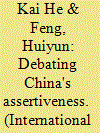

|
|
|
|
|
| Publication |
2012.
|
| Summary/Abstract |
Engaging the recent debate on China's assertive foreign policy, we suggest that it is normal for China - a rising power - to change its policy to a confident or even assertive direction because of its transformed national interests. We argue also that it is better to understand future US-China relations as a bargaining process. Whereas China negotiates for a new status in the system with redefined interests, the United States and other countries need to adjust their old political practices. China's 'core interest' diplomacy launched in 2009 is the first step in revealing 'private information' for peaceful bargaining with the outside world. A status quo foreign policy is not a wise choice for the United States because of the changing power and interest configurations in the international system.
|
|
|
|
|
|
|
|
|
|
|
|
|
|
|
|
| 2 |
ID:
119230


|
|
|
|
|
| Publication |
2013.
|
| Summary/Abstract |
How and why do some foreign policy crises end successfully and efficiently, but others do not? Do democracies deal better than non-democracies with foreign policy crises? Focusing on both the outcome and the duration of foreign policy crises, this article employs event history (survival) analysis to model and test three models of foreign policy crisis derived from realist, liberal, and constructivist theories and the level-of-analysis framework. The dataset in this article is drawn from the International Crisis Behavior Project, 1918-2007. The analysis indicates that democracies are more likely to solve a foreign policy crisis successfully and efficiently than non-democracies. While the involvement of international organization during a crisis has a negative effect on a state's goal of 'winning' a crisis more quickly, the increasing power of a rival also hinders and prolongs the achievement of success in a crisis. Finally, the more violence a state uses during a crisis, the more difficult it is for this state to solve the crisis in a timely manner.
|
|
|
|
|
|
|
|
|
|
|
|
|
|
|
|
| 3 |
ID:
092620
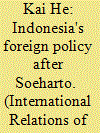

|
|
|
|
|
| Publication |
2008.
|
| Summary/Abstract |
Indonesian politics opened a new phase of democratization after Soeharto stepped down from his 32 years of authoritarian rule. In this paper, Indonesia's foreign policy changes after Soeharto are systematically examined through an 'international pressure-political legitimacy' model derived from neoclassical realism. This model specifies that Indonesia's foreign policy during democratization is mainly influenced by two factors: international pressure and the political legitimacy of the new democratic government. Four cases of foreign policy decision-making from three post-Soeharto presidencies are examined: (i) Indonesia's East Timor policy under Habibie; (ii) Indonesia's 'silence response' toward China's protest on the anti-Chinese riots under Habibie; (iii) Wahid's 'looking towards Asia' proposal; and (iv) Megawati's anti-terrorism and Aceh military operation. The results show that political legitimacy shapes the nature of state behavior, i.e. balancing or compromising, whereas international pressure determines the pattern of state behavior, i.e. external/internal balancing or compromising in words/in deeds
|
|
|
|
|
|
|
|
|
|
|
|
|
|
|
|
| 4 |
ID:
190662
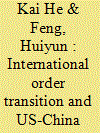

|
|
|
|
|
| Summary/Abstract |
The world is changing, and the liberal international order (LIO) is at stake. Scholars and pundits hold different views on whether and how an order transition will take place. We argue that the divergent arguments around LIO are rooted in contested conceptualizations of what an international order is as well as the untheorized measure of what counts as a ‘transition’ of international order. We propose a synthesized and deductive approach to defining international order with three pillars: power, institutions, and norms. We argue that a significant order transition will take place when at least two pillars of the order are fundamentally challenged and eventually changed. Applying this deductive, three-pillar conceptual framework of international order, we preliminarily examine how US-China competition has impacted the current LIO in the Indo Pacific. We conclude that the multi-pillar feature of the international order technically strengthens the sustainability and resilience of the current LIO. Even though China’s rise might change the power distribution in the system—the power pillar of the order, the mere power shift between China and the United States will not lead to a significant order transition if the other two pillars of the order remain intact.
|
|
|
|
|
|
|
|
|
|
|
|
|
|
|
|
| 5 |
ID:
167319
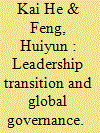

|
|
|
|
|
| Summary/Abstract |
The establishment of the Asian Infrastructure Investment Bank (AIIB) signified China’s ‘charm offensive’ towards multilateral institutions and existing global financial governance. If the rise of China is inevitable, what will the future world look like, and what should other countries be prepared for? Borrowing insights from institutional balancing theory and role theory in foreign policy analysis, this project introduces a ‘leadership transition’ framework to explain policy dynamics in global governance, with the AIIB as a case study. It suggests that China, the United States, and other countries have employed different types of institutional balancing strategies, i.e. inclusive institutional balancing, exclusive institutional balancing, and inter-institutional balancing, to compete for influence and interest in the process of establishing the AIIB. A state’s role identity as a ‘leader’, a ‘challenger’, or a ‘follower’ will shape its policy choices in global governance regarding different institutional balancing strategies in the process of ‘leadership transition.’ Institutional balancing is a new type of balancing among states in the future transformation of global governance. China’s institutional rise in global governance, therefore, might be more peaceful than widely predicted.
|
|
|
|
|
|
|
|
|
|
|
|
|
|
|
|
| 6 |
ID:
190661
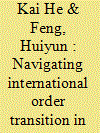

|
|
|
|
|
| Summary/Abstract |
The world is in crisis. The Covid pandemic and the ongoing Russia-Ukraine war signify a potential order transition in the international system. The Indo Pacific is at the center of gravity of great power competition between the US and China. How have policy elites in the region perceived the potential order transition against the background of US-China strategic competition? How have states, including both great and secondary powers, chosen different strategies to cope with security and economic turbulence in the Indo Pacific? This special issue intends to shed some light on these questions by critically examining the diverse perceptions and policy choices of the United States, China, South Korea, India, Japan, Indonesia, and the UK during the period of potential order transition in the Indo Pacific. It provides an academic platform for scholars to engage in this ‘order transition’ topic from different theoretical perspectives as well as from respective national angles in the Indo Pacific. It suggests that the complexity of the international order itself has made the ‘order transition’ more complicated and difficult than before. It is the best of times, it is the worst of times, and it is the most challenging time for state leaders and scholars alike.
|
|
|
|
|
|
|
|
|
|
|
|
|
|
|
|
| 7 |
ID:
114903
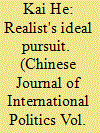

|
|
|
|
|
| Publication |
2012.
|
| Summary/Abstract |
It is no exaggeration to say that Yan Xuetong's Ancient Chinese Thought,
Modern Chinese Power is a path-breaking project that integrates ancient
Chinese philosophy, Pre-Qin history, and contemporary International
Relations (IR) theory. Although Yan has not introduced a new grand
theory of IR in the book per se, he has paved a fresh theoretical and intellectual path to reforming current, western-philosophy-and-history-based IR
theory. If scholars follow Yan's guidance and approach as laid out in the
book, it will be no surprise to see developed more than one new IR theory.
|
|
|
|
|
|
|
|
|
|
|
|
|
|
|
|
| 8 |
ID:
172118
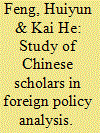

|
|
|
|
|
| Summary/Abstract |
A review of studies of China’s foreign policy reveals three dominant methods: the area studies approach, the IR theory method, and the integrated approach. We suggest that it is time to pay close attention to an emerging research program focusing on the study of Chinese international relations (IR) scholars, especially their internal debates, as a new venue to understand China’s foreign policy. Although Chinese IR scholars are normally quoted as valuable sources in the study of Chinese foreign policy in general, there is no systematic study of China’s IR scholars per se. In order to transform the study of Chinese IR scholars to a full-fledged research program, researchers need to pursue theoretical innovations on the relationship between different types of IR scholars and foreign policy inquiries, advance multi-method research designs across the different methods of field interviews, textual analysis, and opinion surveys, as well as encourage international collaboration between Chinese scholars and non-Chinese scholars.
|
|
|
|
|
|
|
|
|
|
|
|
|
|
|
|
|
|
|
|
|